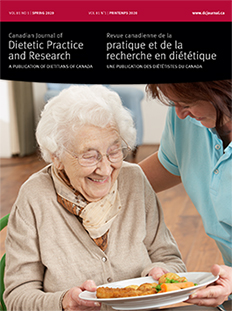Abstract
Purpose: To examine the relationship between Food and Nutrition graduates’ involvement in faculty-supervised extracurricular experiential learning activities (FEEs) and the development of dietetic competencies.
Methods: An original web-based survey, assessing involvement in FEEs and self-perceived level of Canadian dietetic competencies, was administered to Brescia University College Food and Nutrition graduates for graduation years 2011–2017. Competency scores were calculated for each respondent in 4 practice areas (Professional Practice, Communication and Collaboration, Population and Public Health, and Management), and summed for a Total Competency Score. Multiple linear regressions were used to assess predictors of competency scores.
Results: The final sample consisted of 233 respondents who participated in 1.9 ± 1.1 FEEs. The highest average competency score (out of 100) was Communication and Collaboration (59.7 ± 31.7); the lowest was Management (40.3 ± 30.9). Total hours spent and breadth of experiences in FEEs were significant predictors of all scores (P < 0.05). Depth of experiences was a significant predictor of all competency scores (P < 0.05) except for Management (P = 0.27).
Conclusions: Participation in FEEs contributes to Food and Nutrition students’ development of entry-level dietetic competencies; therefore, counting some FEEs as curricular credits may be warranted. Given the prominence of competency-based learning assessments, these results also have implications for faculty resources, budgets, and collective agreements.
Résumé
Objectif. Examiner la relation entre la participation des diplômés en nutrition aux activités d’apprentissage expérientiel parascolaires (AAEP) supervisées par des membres du corps professoral et l’acquisition de compétences en diététique.
Méthodes. Des diplômés en nutrition du Brescia University College (cohortes de 2011 à 2017) ont répondu à un sondage Web original évaluant leur participation aux AAEP et la perception de leur niveau de compétences en diététique. Les scores de compétence ont été calculés pour chaque répondant dans quatre domaines de la pratique (pratique professionnelle, communication et collaboration, santé publique et des populations, et gestion) et additionnés pour obtenir un score de compétence total. Des régressions linéaires multiples ont été utilisées pour évaluer les prédicteurs des scores de compétence.
Résultats. L’échantillon final comprenait 233 répondants ayant participé à 1,9 ± 1,1 AAEP. Le score de compétence moyen le plus élevé (sur 100) était celui de la communication et de la collaboration (59,7 ± 31,7); et le plus faible était celui de la gestion (40,3 ± 30,9). Les heures totales consacrées aux AAEP et l’étendue des expériences d’AAEP étaient des prédicteurs importants de tous les scores (P < 0,05). La portée de l’expérience était un prédicteur important de tous les scores de compétence (P < 0,05) à l’exception de celui de la gestion (P = 0,27).
Conclusions. La participation à des AAEP contribue à l’acquisition de compétences en diététique de niveau d’entrée chez les étudiants en nutrition. Par conséquent, il pourrait être justifié d’accorder des crédits pour certaines AAEP. Étant donné l’importance de l’évaluation des apprentissages basée sur les compétences, ces résultats ont également des répercussions sur les ressources professorales, les budgets et les conventions collectives.



